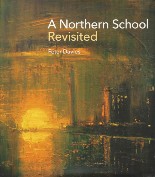 Liverpool, Manchester, and Birmingham are great 19th century English cities brought forth by the proceeds of manufacturing by the Industrial Revolution. British Society changed which naturally evolved a new patronage for the arts. The story of this book then, “A Northern School Revisited” (published in 2015 by ClarkArt Ltd) by Peter Davis, is a most welcome revisiting of a narrative art practice from that time of recent forefathers which still has a presence in today’s art culture, now known as community art.
Liverpool, Manchester, and Birmingham are great 19th century English cities brought forth by the proceeds of manufacturing by the Industrial Revolution. British Society changed which naturally evolved a new patronage for the arts. The story of this book then, “A Northern School Revisited” (published in 2015 by ClarkArt Ltd) by Peter Davis, is a most welcome revisiting of a narrative art practice from that time of recent forefathers which still has a presence in today’s art culture, now known as community art.
London, the nation’s capital, had other ambitions—signified by epic nature, epic battles, heroes, and stories of Gods, where needed (Christian and otherwise), to illustrate the legitimacy of pomp and circumstance on the stage of international politics.
There was also a possible urge to compete with the glories of the Vatican and to demonstrate the worthiness of the nation state—to parade into a world stage of diplomacy. The Industrial Revolution urbanized a rural, land-working people into a modern urban proletariat by transforming the rural landscape into an urban scape. The dark satanic mills invaded the pleasant green land of England and spawned an empire. New realities of smoke, grime, and pollution became the backdrop of life and sensibility for the working class.
This elegant book provides a selection of over a hundred reproductions of very worthwhile 19th century picture-making—not decided by intellectual speculation but by a response to the work of an artisan-based culture dealing with an industrial environment through observation.
L.S. Lowry, rightly so, takes pride of place with a lead photograph on page 6. The now well-established, revered, and basically self-taught artist’s
work has captured the interest and respect of the cognoscenti of the art world. Lowry’s well-known stick figures circulate through an elegant structured industrial landscape, achieving a larger statement, free from the romantic overworking and often sentimental renderings of the Academy.
A fascinating subplot is offered by the author. His acute sensitivity to the nuances of form and expression characterises the different natures of Liverpool, Manchester, and Birmingham. “A Northern School Revisited” comprises works drawn from these different industrial locations.
For example, Liverpool has a unique space. It is the great sea port of the North of England where cramped slum terraced housing is a stone’s throw from the sea and where the horizon is seen that leads the longing imagination into distant worlds.
Manchester and Birmingham are landlocked and each city, with its own historical configuration of town planning and architecture, produce different narratives. The reader will experience this within the elegant text, well illustrated by a choice selection of paintings that make the point clear. The present day art world of Postmodernism in which technology presents new options such as video, performance, conceptual, and installation art are promoted and encouraged by art schools. The new space of the computer along with unhinged philosophical speculation tempt the young artist into new horizons. “A Northern School Revisited” is a journey into the new horizons of yesterday, which happen to be a backyard, confined and domestic, poignant in the sense of turning the pages of the family photographic album. This is an important reminder that yesterday is a narrative and memento of lives recently lived—a beauty that has a different form shaped by other aspirations of an emerging mass audience. But fashion lurks in a beauty appreciated by a mass audience. When fashion is triumphant, art suffers.
The lesson this writer learned from this book was a reacquainted respect for the now lost craft of pictorial painting. It is a timely reminder that technology may change but human nature does not. The danger of “A Northern School Revisted” is that its experience could be easily watered down by the all
Derek Guthrie, Publisher
Volume 31 number 2, November / December 2016 p 35
